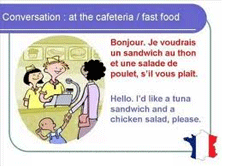What are some phrases for conversation?
 What are Some Phrases for Conversation?
What are Some Phrases for Conversation?
Phrases are expressions that we use in our daily conversation. These phrases are often used while talking or conversing with others. These phrases are very useful and help us talk better.
Some Common Phrases for Conversation
Common Phrases
Some common phrases for conversation are as follows:
Example:
|
Greetings |
Formal |
Informal |
|
|
Hello How are you? How are you doing? How is everything? How have you been? Good morning / Good afternoon / Good evening |
Hi What’s up? How is life? What’s up with you guys? Good morning / Good afternoon / Good evening |
|
Introducing Self
|
Hello, I am Bindiya Deb. (Say your full name in case of formal situations) It’s nice to meet you. It’s nice meeting you. Nice to meet you! |
Hello, I am Bindiya. (Just tell first name in case of informal situations) It’s nice to meet you. It’s nice meeting you. Nice to meet you! |
Example:
|
Expressing Thanks
|
Thank you. Thank you for the nice gift. Thanks for your time. |
Example:
|
Short questions and answers
|
Are you a teacher? Yes, I am. No, I am not. Is she sick? Yes, she is. No, she isn’t. Is it time to leave? Yes, it is. No, it isn’t. Can I eat pizza? Yes, you can. No, you can’t. Does she drink tea? Yes, she does. No, she doesn’t.
|
Example:
Some important expressions that you might use while you’re at a store.
|
At the store
|
Shopkeeper Hello Madam. How May I help you?/How Can I help you? |
Customer Yes, I am looking for an evening gown. Can you tell me where the ladies section is? Can you tell me where can I get the skirts?
|
|
While coming back from the store/leaving the store |
Did you get everything? Are you done, Madam? Will that be all? |
That’s it. Thank you. |
Example:
Asking for information
|
What’s it? What are those? What are these? What’s that? Where is your mother? |
It’s a pencil. Those are roses. These are pens. That’s a rabbit. She is over there. |
Example:
Future plans and arrangements
|
What will they do tomorrow? |
They will go for a movie. |
|
Where will you stay tonight? |
I will stay with my uncle. |
|
When will we reach home? |
We will reach home by 7 pm. |
|
How will you reach office? |
I will take a bus. |
English and Conversation
Different kinds of phrases and expressions are used in English. These phrases are very helpful and will help you talk fluently in English. If you learn these phrases, then you can become very confident and fluent in English. You can learn these phrases with the help of online classes. The online English classes are conducted by experienced tutors who will help you learn very quickly and in short span of time. These classes will help you improve your speaking skills and will teach you many new phrases, expressions which can be used in your daily conversation.
Want to know more about “Phrases for Conversation?” Click here to schedule live online session with e Tutor!
About eAge Tutoring
eAgeTutor.com is the premier online tutoring provider. eAge’s world class faculty and ace communication experts from around the globe help you to improve in an all round manner. Assignments and tasks based on a well researched content developed by subject matter and industry experts can certainly fetch the most desired results for improving spoken English skills. Overcoming limitations is just a click of mouse away in this age of effective and advance communication technology. For further information on online English speaking course or to experience the wonders of virtual classroom fix a demonstration session with our tutor. Please visit www.eagetutor.com.
Contact us today to know more about our spoken English program and experience the exciting world of e-learning.
Reference Links:
How to learn English through listening?
What is listening?:
 The dictionary meaning of listening is “to give attention with the ear” or “to attend closely for the purpose of hearing.” Listening plays a very important role in improving our spoken English skills.
The dictionary meaning of listening is “to give attention with the ear” or “to attend closely for the purpose of hearing.” Listening plays a very important role in improving our spoken English skills.
We listen with the help of our ears. Our brain converts that sound into a meaningful message. For effective listening, focus and attention is required. Some people are there who cannot concentrate when others speak and thus they are considered as poor listeners. Effective listening not only helps you understand what others are speaking but it also helps you give correct reply. It also helps you become a good speaker.
 Importance of Listening: Why is Listening important?
Importance of Listening: Why is Listening important?
Listening is of immense importance. Toddlers grow up by listening to adults. That’s how they learn how to speak a language. If you want to improve your communication skills and become fluent in English language, you should improve your listening skills first. While you listen to others it gives you an idea about pronunciation of words, use of intonation, correct usage of words etc.
 ACTIVE AND PASSIVE LISTENING
ACTIVE AND PASSIVE LISTENING
What is active and passive listening?
Passive listening is a kind of listening in which the speaker is allowed to speak without any kind of interruption or reaction from the listener while Active listening is a kind of listening in which you react or do something that shows that you are listening to the speaker. Sometimes ( non verbal cues) such as nodding the head, or making different facial expressions are also used by the listener in order to make the speaker understand that he is paying attention. In order to improve your fluency in English, active listening is required. Active listening will help you improve your listening skills as well.
How to learn English through listening?:
 Listening can be used as an effective tool to learn English language. There are many ways through which one can learn English. Newscasts also known as bulletins are broadcasted on television every day.
Listening can be used as an effective tool to learn English language. There are many ways through which one can learn English. Newscasts also known as bulletins are broadcasted on television every day.
Different Ways of Learning English through Listening
A person who wants to learn English can listen to news programs that are broadcasted on television and develop his/her listening skills. Listening to newscasts on radio can also help a person improve his/her listening skills and learn the language. A person can also learn English by joining the spoken English classes. The spoken English classes are conducted online. The spoken English classes are conducted by accomplished, experienced and efficient spoken English tutors who can help people improve their pronunciation, diction and fluency. The spoken English teachers will help you improve your listening skills through different kinds of activities. Along with listening skill your fluency will also improve. Another good habit is watching English movies. Watching English movies help you develop your listening skill. Good listening skill can help you improve your fluency in the long run.
Want to know more “English through Listening” Click here to schedule live online session with e Tutor!
About eAge tutoring:
eAgeTutor.com is the premier online tutoring provider. eAge’s world class faculty and ace communication experts from around the globe help you to improve in an all round manner. Assignments and tasks based on a well researched content developed by subject matter and industry experts can certainly fetch the most desired results for improving spoken English skills. Overcoming limitations is just a click of mouse away in this age of effective and advance communication technology. For further information on online English speaking course or to experience the wonders of virtual classroom, fix a demonstration session with our tutor. Please visit www.eagetutor.com.
Contact us today to know more about our spoken English program and experience the exciting world of e-learning.










